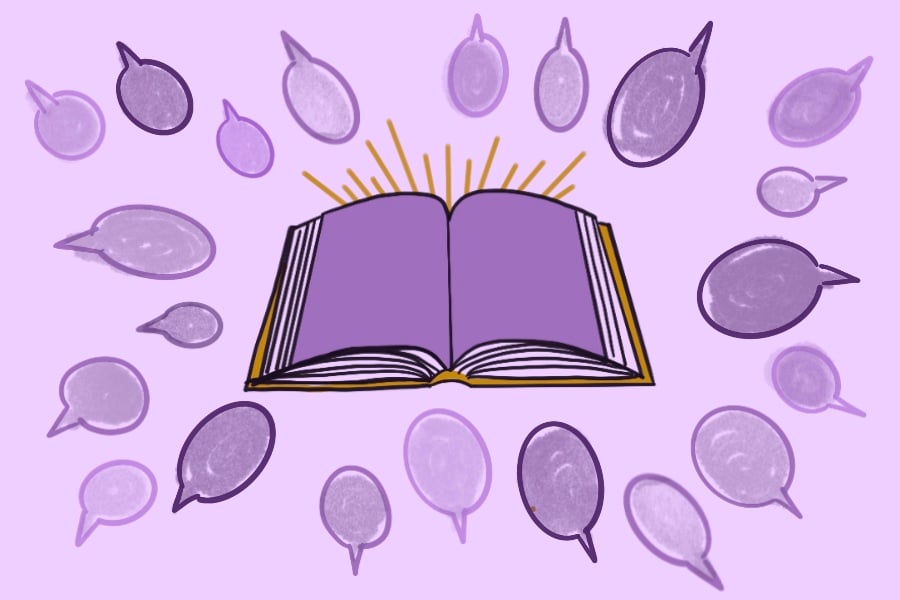MSA Queer Book Club, APIDA Book of the Quarter to hold discussions in winter
NU identity-based book clubs host events throughout this quarter.
February 1, 2022
Cozying up with a novel is often a luxury for Northwestern students, as finding free time can be difficult amid a busy quarter system.
Book Clubs and Reading Series, a NU Multicultural Student Affairs program, creates a diverse and interactive space for literature lovers.
While the program offers a range of identity-based book clubs, the APIDA Book of the Quarter and the Queer Book Club are the only two that plan to meet this quarter.
Matthew Abtahi, assistant director in MSA, said these informal book clubs create a safe and comfortable environment for students connected by their shared identities.
Abtahi works directly with the Queer Book Club, which is co-sponsored by MSA and the Gender and Sexuality Studies Program. The club will center transgender and non-binary narratives this quarter, Abtahi said.
He added that the clubs operate independent of each other despite operating under MSA. Because some students might be in multiple book clubs, they ensure the discussion dates don’t overlap.
English and Gender and Sexuality Studies Prof. Nick Davis, co-facilitator of the Queer Book Club, said the club is at the intersection of Gender and Sexuality Studies, the Women’s Center, Campus Inclusion & Community and MSA.
“When Gender Studies was founded as an academic unit in the late ‘80s and early ‘90s, there was pressure to convince people that its academic study was not the same thing as a support unit or affinity space,” Davis said.
He said this caused a tangible divide between GSS as an academic department and MSA, and students involved in one or the other rarely had the opportunity to interact.
Yet, Abtahi and Sarah Brown, the director of the Women’s Center, collaborated to develop new programming focused on blending these organizations.
Through this, faculty were invited to host a communicative space — the book club — that wasn’t formalized as a course.
“Students wanted to meet different faces than they’re necessarily meeting from their courses,” Davis said. “A lot of the students in the reading group were not even in the humanities, much less GSS majors, so to hear some new voices and get out of our pockets was great.”
The Queer Book Club will be reading “The Subtweet” by Vivek Shraya, which discusses the music and art industry of the modern era. The club will discuss it on Feb. 24 from 6 to 7:30 p.m. in a hybrid format, and sign ups are open on the MSA website.
The APIDA Book of the Quarter club, co-sponsored by the Asian American Studies Program and MSA, will hold its fifth annual discussion on Feb. 8 on “Afterparties” by Anthony Veasna So. This book compiles short stories from the perspective of Cambodian American immigrants living in California.
Christine Munteanu, assistant director of MSA, said she hopes students discover new experiences within the Asian American community while celebrating their own.
”We try to choose books that represent the diverse swath of who is within APIDA, and might not be something they read in an Asian American studies class,” she said. “But, I love hearing the way that students really connect with a piece of literature.”
Munteanu said she’s loved witnessing growth of other MSA book clubs modeled on the APIDA Book of the Quarter, which started in fall 2017.
“All of the different book clubs that are popping up in MSA are all attempts to just make sure students can see themselves represented in literature,” Munteanu said.
Davis said the book clubs are a blessing within the busy atmosphere of a university.
“This is a campus full of ambitious people who are working hard to keep up, and some things we get told we just have to do,” Davis said. “To have a space where that’s not the filter through which we’re meeting each other, and where we all share a common identity, is a blessing.”
Email: [email protected]
Twitter: @charlottehrlich
Related Stories:
— Reading your heritage: affinity book clubs on campus
— Away from campus, students connect to each other through virtual book clubs


